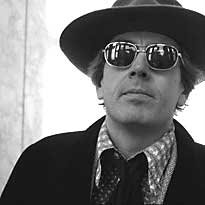 I've been meaning to comment on this post from Kyle Gann ever since he posted it way back on February 28. Recently there have been some entertaining posts regarding Robert Ashley at The Standing Room and The Fredosphere that helped stir up my conflicted feelings on the music of Robert Ashley.
I've been meaning to comment on this post from Kyle Gann ever since he posted it way back on February 28. Recently there have been some entertaining posts regarding Robert Ashley at The Standing Room and The Fredosphere that helped stir up my conflicted feelings on the music of Robert Ashley.Kyle Gann concisely sets up four pillars for an American musical revolution:
Conlon Nancarrow for rhythm; La Monte Young (or alternatively, Ben Johnston) for pitch; Morton Feldman for texture and continuity; and Ashley for the relation of text to structure and music.This hit pretty close to home for me and I've been mulling it over for months. I have enormous enthusiasm for Conlon Nancarrow. I love those player piano works as well as the handful of chamber works I've heard. His rhythmic ideas are a rich vein of ideas yet to be fully mined. So far I'm on board with the revolution. In case you haven't noticed the "Scale of the Day" posts all over the place I'll just state that I'm a nut for alternative intonation. So LaMonte Young and Ben Johnston are big in the HurdAudio universe. The revolution keeps sounding better all the time. Morton Feldman is another significant influence. Particularly for texture and continuity. So at this point Gann has called out some figures near and dear to my aesthetic sensibilities. Then he has to throw Robert Ashley into the mix.
I really want to have the same kind of enthusiasm for Ashley that I have for the other three-quarters of the American musical revolution. I am familiar with his work. I've seen it performed live and I periodically give it another chance from time to time. But it plays right into my difficulties with text and voice in music. I admire that he's striving to solve the text/music conundrum but I'm left feeling like he addresses the issue by compounding it. I can't quite put my finger on what exactly rubs me the wrong way because it often seems like he's "doing everything right." Yet I'm reluctant to embrace both the sound and the aesthetic.
To my ears the relation of text to structure and music is a riddle yet to be worked out. Harry Partch hit on a nice track by bending music to fit the natural rhythms and harmonies of spoken prose. But the larger issue for me is content. Words carry such heavy baggage that seem to drain the contrast out of most sonic environments. The missing leg of this American musical revolution seems to call for a different kind of poetry that I have yet to encounter.


2 comments:
Robert Ashley concerts are total tedium!!!!
Jerrie
Words are indeed difficult. Some Text Sound people try to get around this by using words that don't have much in the way of meaning, like Amirkhanian's work with the phrase "Dutiful Ducks." Other folks use a lot of repition until the meaning sort of disappears. Some people, like Trevor Wishart, use made up nonsence words.
Ashley seems to often go for speed. Perfect Lives is a lot like A Prarie Home Companion, but much much faster. Because it's too much going by to pick up all the meaning of what he's saying, you can fall into just the intionations of his voice. (Especially if you try to watch the whole thing in one sitting.) So just talking quickly can be a way to reduce the meaning in the words.
Ashley gets his source words from just listening to people at diners, like Zippy the Pinhead or from listening to ranting crazy people and copying their content and intonations.
However, I think you're right that you can't ever entirely escape the primary power of literal menaings of words (made-up languages may be excepted from this). This is why Text Sound is called Poetry.
Personally, I love Robert Ashley and text-based works in general. Have you tried _Music as a Second Language_ by Paul De Marinis? The whole album is brilliant. I especially like the piece "Cincinatti." It's great because it's hard to understand and the topic is alarming, so the listener dances between trying to pay more attention and trying to pay less attention.
I think addressing text is interesting just because it's so primary. Everyone can relate to speech and our brains are hard-wired to recognize it and decode it. I think this gives the composer more power to manipulate, although in different ways.
Post a Comment